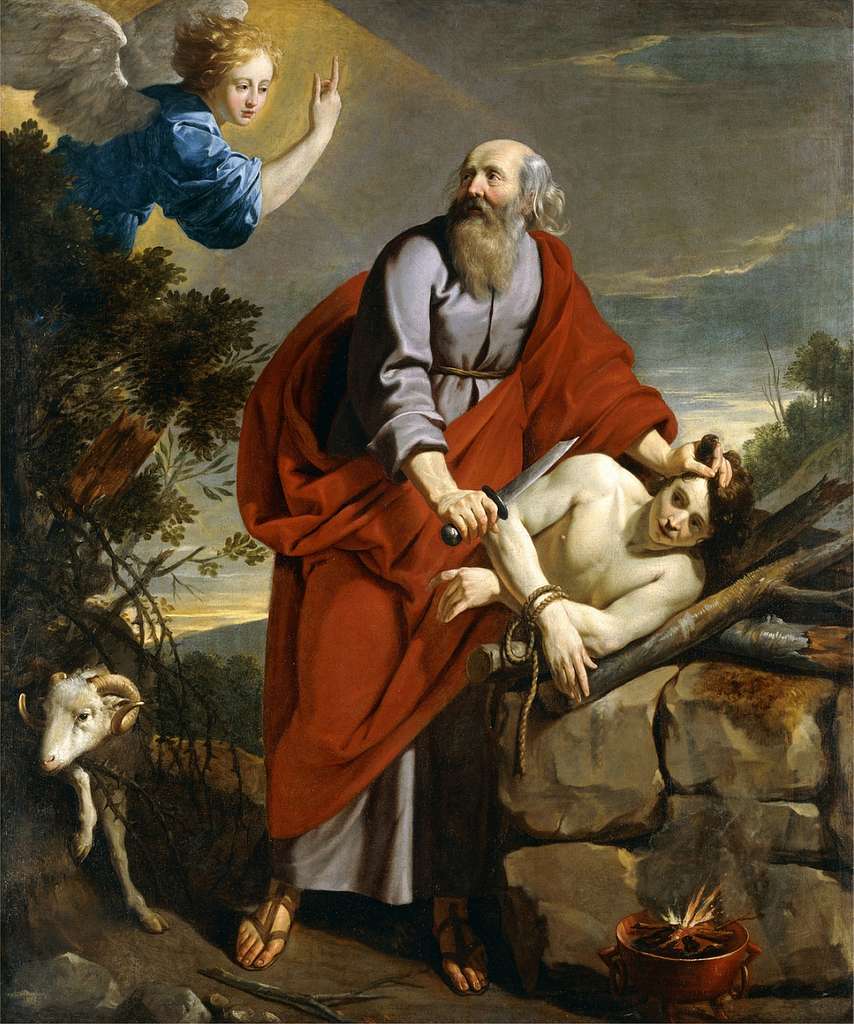
“And it came to pass…that God did tempt Abraham, and said unto him, Abraham… Take now thy son, thine only son Isaac, whom thou lovest, and get thee into the land of Moriah; and offer him there for a burnt offering upon one of the mountains which I will tell thee of.
And Abraham rose up early in the morning, and saddled his ass, and took two of his young men with him, and Isaac his son, and clave the wood for the burnt offering, and rose up, and went unto the place of which God had told him…And Abraham said, My son, God will provide himself a lamb for a burnt offering…”
Genesis 22:1-3,8
Abraham didn’t want to wait on God; he wanted to jump ahead of God. He wanted to say, “Oh, God, I trust in You, but let me go ahead and have a son. Time has passed, we’re getting too old, Sarah can’t have a baby anymore, and I’m going to go ahead of you, God.”
Therefore, Hagar bore Abraham the first of his sons and they called him “Ishmael.” Hagar was an Egyptian. Her son was a type of the flesh, of the world. God called the Israelites out of Egypt, out of the world. But Abraham went back to the world system God had called him out of, and received a son from a daughter of the world. It was mankind’s provision.
In time, Sarah, Abraham’s wife, said unto him “…Cast out this bondwoman and her son: for the son of this bondwoman shall not be heir with my son…Isaac…And God said unto Abraham, Let it not be grievous in thy sight because of the lad, and because of thy bondwoman; in all that Sarah hath said unto thee, hearken unto her voice; for in Isaac shall thy seed be called. And also of the son of the bondwoman will I make a nation because he is thy seed” (Genesis 21:10, 12-13).
God acknowledged both sons of Abraham. He didn’t ignore one. But Isaac, the one God provided, was the one He officially recognized. Down the way, God still acknowledged this other son, but He couldn’t fully recognize Ishmael because God doesn’t recognize the works of the flesh. He recognizes the works of the Spirit, and Isaac was the one of the Spirit.
“And Abraham…sent her away: and she departed, and wandered in the wilderness of Beersheba…she cast the child under one of the shrubs. And she went, and sat her down over against him a good way off, as it were a bowshot: for she said, Let me not see the death of the child.
And she…wept…and the angel of God called to Hagar out of heaven, and said…fear not; for God hath heard the voice of the lad where he is. Arise, lift up the lad…for I will make him a great nation….”
Genesis 21:14-18
God still gave the world—the works of the flesh—a chance here. He opened Hagar’s eyes through the Spirit and gave her a chance to see, “and gave the lad drink” (Genesis 21:19). The water in this case was the living water. “And God was with the lad; and he grew, and dwelt in the wilderness…and his mother took him a wife out of the land of Egypt” (Genesis 21:20-21), out of the world.
God gave her a chance. Even though she was of the flesh, He still provided. In Genesis we read “And it came to pass after these things that God did tempt [test] Abraham” (Genesis 22:1). God does not tempt us, the devil does. God tests us, which is the correct translation of the word used here.
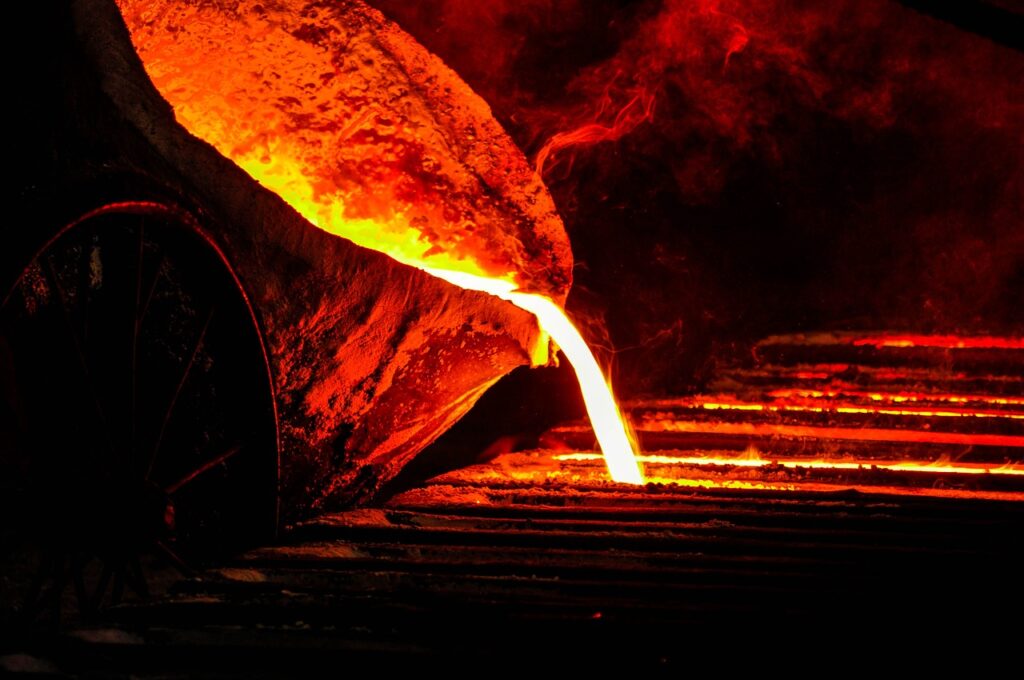
When God works on us, He tries us like gold in the fire. He removes all the impurities out of us. He squeezes, molds and pushes on us and torques us down tight, and we say, “God, I can’t take this!” The Lord brought Abraham to the breaking point through his only true son from God—not through the works of the flesh.
He tested him, saying, “Abraham…take now thy son, thy only son Isaac, whom thou lovest, and get thee to the land of Moriah; and offer him there for a burnt offering upon one of the mountains I will tell thee of. And Abraham rose up early in the morning and saddled his ass…” (Genesis 22:2-3).
He got right up, got everybody together and got going. He didn’t waste time, because faith was building up in him—he knew—HE KNEW!
Abraham didn’t say, “Well, God, it might be of You and it might not. I’ll just wait a few days and maybe just linger and hold off a bit.” No. “He rose up early in the morning…” He got right up, got everybody together and got going. He didn’t waste time, because faith was building up in him—he knew—HE KNEW!
Then he “…saddled his ass and took two of his young men with him, and Isaac his son, and clave the wood for the burnt offering, and he rose up, and went unto the place of which God told him. Then on the third day…” (When did Christ rise from the dead? The third day.)
In Abraham’s mind, the sacrifice was already made; Isaac was already dead. Then “…Abraham lifted up his eyes and saw the place afar off. And Abraham said…I and the lad will go yonder and worship and come again unto you” (Genesis 22:3-5). The “lad” here was maybe twenty-five or thirty years old and could overpower his own father. He could have said, “What are you doing? I can’t do this. You’re going to kill me.”
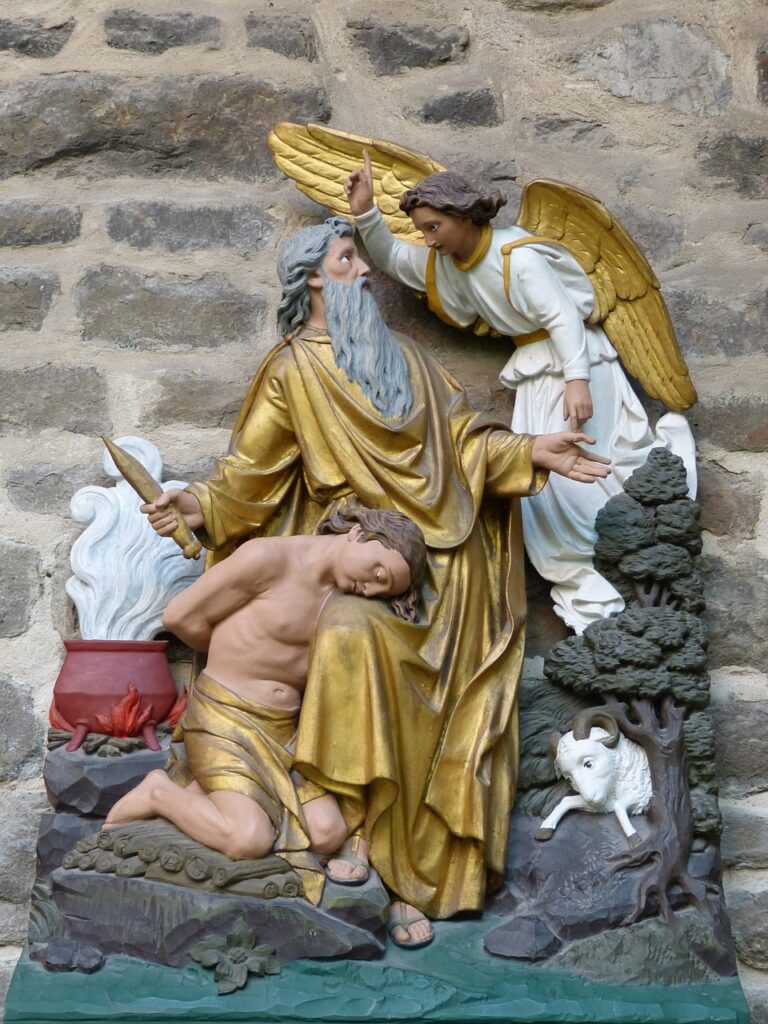
No, Isaac was willing. Abraham said, “…I and the lad will go yonder and worship and come again unto you. And Abraham took the wood of the burnt offering, and laid it upon Isaac his son; and he took the fire in his hand, and a knife; and they went both of them together. And Isaac…said, My father…Behold, the fire and the wood: but where is the lamb for a burnt offering?
And Abraham said, My son…” (now pay attention here) “…God will provide himself a lamb for a burnt offering…” (Genesis 22:5-8 emphasis added). Does that sound right? Read it again. He didn’t say “God will provide for Himself a lamb for a burnt offering.” He said “God will provide HIMSELF a lamb for a burnt offering.” This is His provision.
Who could that lamb be? Go now to the book of John: “…John seeth Jesus coming unto him, and he saith, “Behold, the lamb of God which taketh away the sin of the world…this is the Son of God. And again, the next day, after John stood and two of the disciples and looked at Jesus as He walked and he saith, Behold the Lamb of God…” (John 1:29, 34-36 emphasis added).
“…so they went both of them together. And they came to the place which God had told them of; and Abraham built an altar there, and laid the wood in order, and bound Isaac his son, and laid him upon the altar of wood” (Genesis 22:8-9). Look at this last part again—He “…laid the wood in order and bound Isaac his son….” What happened before Jesus’ resurrection? He was laid upon a wooden cross. Look at the parallel here between God the Father, as in Abraham, and God the Son, as in Isaac. See the connection? Do you see something here similar to God’s Son being laid upon the cross and being bound?
Abraham didn’t just pause and say, “What’s that? Hmm, let me go and sacrifice Isaac here, and then I’ll see what that sound is.”
A little further on it says, “…Abraham stretched forth his hand, and took the knife to slay his son. And the angel of the Lord called unto him out of heaven, and said, Abraham, Abraham…”(Genesis 22:10-11). Notice that He calls Abraham’s name twice.
When the Bible mentions something twice, it’s urgent; pay attention to it. “…and he said, Here am I. And then he said, Lay not thine hand upon the lad, neither do thou any thing unto him…” (Genesis 22:11-12). Abraham didn’t just pause and say, “What’s that? Hmm, let me go and sacrifice Isaac here, and then I’ll see what that sound is.” No—he was ready. He didn’t want to sacrifice his son.
“…Neither do thou any thing unto him: for now I know that thou fearest God: seeing thou hast not withheld thy son, thine only son from me. And Abraham lifted up his eyes, and looked, and behold behind him a ram caught in a thicket by his horns…” (Genesis 22:12-13). Whoa! Stop for a second—it says, He provided “…behind him a ram.” Isn’t that interesting? He didn’t say a lamb. Where is the lamb going to come from? We read that “…John seeth Jesus coming unto him, and saith, Behold the Lamb of God…” (John 1:29 emphasis added).
God sees your needs. God sees what’s going on, then He provides. We’re talking about vision and provision.
But God didn’t provide the lamb here; He provided a ram. It was only temporary. “…Abraham went and took the ram, and offered him up for a burnt offering in the stead of his son. And Abraham called the name of the place, Jehovahjireh” (Genesis 22:13-14). We’ve heard that Jehovah-Jireh means “God my provider,” or “God provides,” but the actual meaning of Jireh here is “sees.” “God sees” or, in this case, “God is seeing.” God sees your needs. God sees what’s going on, then He provides.
We’re talking about vision and provision. Seeing is vision. “…to this day in the mount of the Lord it shall be seen” (Genesis 22:14 emphasis added). That was the way it was said by the Jews then. Where did Abraham go up to offer Isaac? Being “…in the land of Moriah,” he went up to Mount Moriah.
Now for the provision, look at the book of Numbers: “And the people spake against God and said unto Moses…there is no bread, neither is there any water; and our soul loatheth this light bread [manna]” (Numbers 21:5). What were they doing? “Murmuring and complaining.”
Obviously, God didn’t like that, because He sent fiery serpents that bit the people and many died. “Therefore the people came to Moses and said, “We have sinned for we have spoken against the Lord…” (Numbers 21:7). It’s amazing what God has to do to get us out of our own conditions.
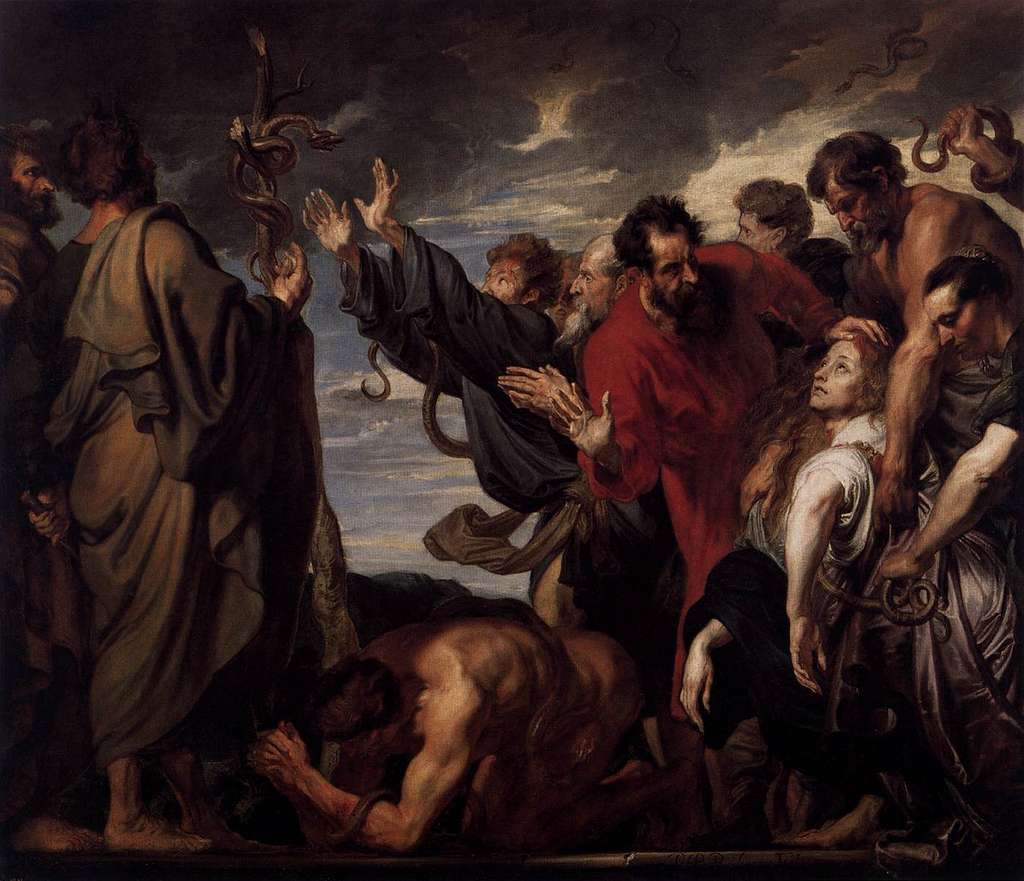
“…we have spoken against the Lord, and against thee; pray unto the Lord, that He take away the serpents from us. And Moses prayed for the people. And the Lord said unto Moses, Make thee a fiery serpent and set it upon a pole. And it shall come to pass, that every one that is bitten, when he looketh upon it, shall live.
And Moses made a serpent of brass, and put it upon a pole, and it came to pass, that if a serpent had bitten any man, when he beheld the serpent of brass, he lived” (Numbers 22:7-9). God provided. He had them make a serpent of bronze and put it upon a pole. In the New Testament, who was put upon a pole (or cross) so that anyone could look up and see so that he might live? Jesus! See the connection here? Another provision of God.
God provided for His righteous children. God’s wrath is not for them. His wrath is for sinners, the lost of this world who have turned away from God, who have refused to listen to Him.
The book of Genesis tells the story of the flood and how God prepared Noah for it. “…the Lord said unto Noah, Come thou and all thy house into the ark; for thee I have seen righteous before me in this generation…I will cause it to rain upon the earth forty days and forty nights; and every living substance that I have made will I destroy from off the face of the earth.
And Noah did according to all that the Lord had commanded him…” (Genesis 7:1, 4-5). God provided for His righteous children. God’s wrath is not for them. His wrath is for sinners, the lost of this world who have turned away from God, who have refused to listen to Him. But God makes provision for His children!
Let’s look now at the book of Daniel: “…the king…set Shadrach, Meshach and Abednego, over the affairs of the province of Babylon: but Daniel sat in the gate of the king. Nebuchadnezzar the king made an image of gold…he set it up in…Babylon.
Then…the king sent to gather together the princes… governors…captains…judges…treasurers…counsellors… sheriffs and all of the rulers of the provinces to come to the dedication of the image…and they stood before the image…Then a herald cried aloud, ‘To you it is commanded, O people, nations, and languages that what time you hear the sound of…all kinds of musick, ye shall fall down and worship the golden image…’” (Daniel 2:49; 3:1-5). But it was not the true image that we are to worship—which is Jesus Christ.
“…at that time when all the people heard the sound of…all kinds of music, all the people…fell down and worshipped the golden image…at that time certain Chaldeans came near, and accused the Jews…and said…Thou, O king, hast made a decree, that every man that shall hear all kinds of musick, shall fall down and worship the golden image: and who so falleth not down and worshippeth, that he should be cast into the midst of a burning fiery furnace.
There are certain Jews whom thou hast set over the affairs of the province of Babylon, Shadrach, Meshach, and Abednego; these men, O king, have not regarded thee: they serve not thy gods nor worship the golden image that thou hast set up.
Then Nebuchadnezzar in his rage and fury commanded to bring…these men before the king[who]…said unto them, “Is it true, O Shadrach, Meshach, and Abednego, do not ye serve my gods, nor worship the golden image which I have set up? Now if ye be ready that at what time ye hear the sound of…all kinds of musick, ye shall fall down and worship the image which I have made; well: but if ye worship not, ye shall be cast the same hour into the midst of a burning fiery furnace; and who is that God that shall deliver you out of my hands?
[They]said…we are not careful to answer thee in this matter. If it be so, our God whom we serve is able to deliver us from the burning fiery furnace, and He will deliver us out of thine hand, O king. But if not, be it known…that we will not serve thy gods, nor worship the golden image…
“…Nebuchadnezzar full of fury…spake, and commanded that they should heat the furnace one seven times more than it wont to be heated. And he commanded the most mighty men that were in his army to bind Shadrach, Meshach, and Abednego, and to cast them into the burning fiery furnace. [They] were bound…and were cast into the midst of the burning fiery furnace. Therefore because the king’s commandment was urgent, and the furnace was exceeding hot, the flame of the fire slew those men who took up Shadrach, Meshach, and Abednego.”
(Daniel 3:7-22)
Nebuchadnezzar was amazed and said unto his counselors, “…Did not we cast three men bound into the midst of the fire?…Lo, I see four men loose, walking in the midst of the fire, and they have no hurt; and the form of the fourth is like the Son of God. Then Nebuchadnezzar came near to the mouth of the burning fiery furnace and spake, and said, Shadrach, Meshach, and Abednego, ye servants of the most high God, [he didn’t say this before!] Come forth and come hither.
Then [they] came forth of the midst of the fire. And the princes, governors…captains and…counselors…saw these men, upon whose bodies the fire had no power, nor was a hair of their head singed, neither were their coats changed, nor the smell of fire had passed on them…” (Daniel 3:24-27).
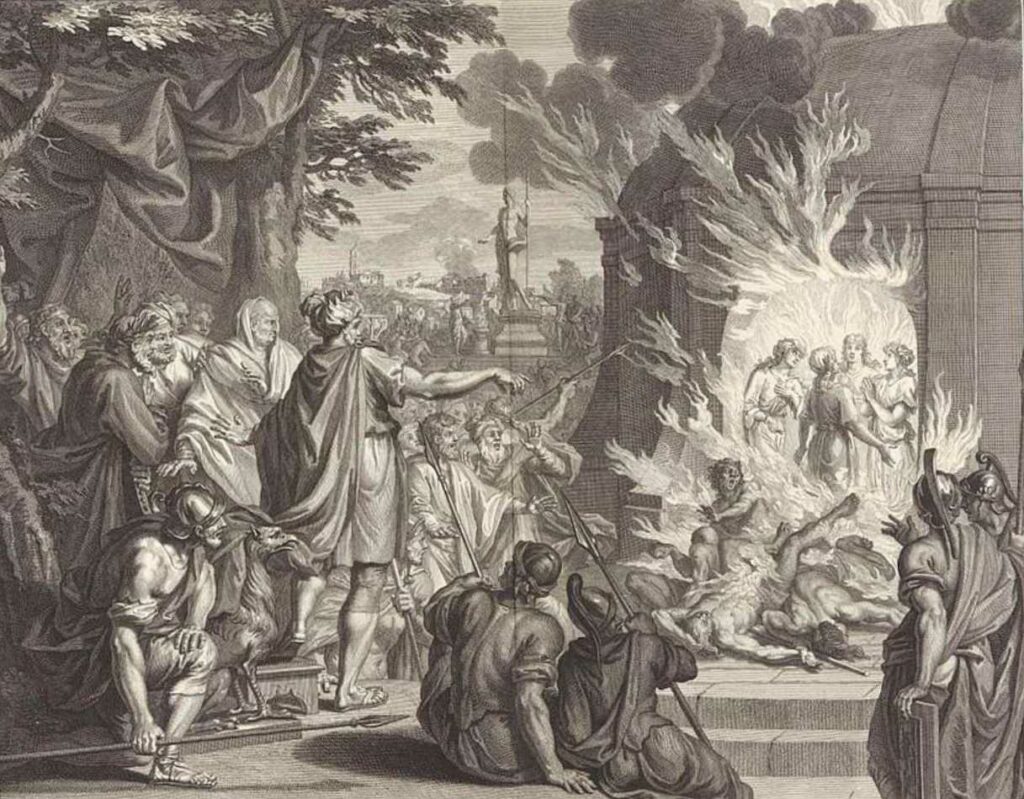
Now that was hot! The fire killed the other men, but not even a smoke smell was on these three young men of God. “…and [God] delivered his servants that trusted in him, and have changed the king’s word, and yielded their bodies, that they might not serve nor worship any god, except their own God…Therefore I make a decree, that every people, nation, and language, which speak any thing amiss against the God of Shadrach, Meshach, and Abednego, shall be cut in pieces…because there is no other God who can deliver after this sort” (Daniel 3:28-29).
After the Church is removed from the earth, God is going to protect the faithful remnant of Jews. He’s going to send that Fourth Man into the fire—of the Great Tribulation—to save and protect them. They will be witnesses going throughout the earth to show what God can do.
We continue to read, “Shadrach, Meshach and Abednego”—but what happened to Daniel? Was it not four men when they started? Daniel was not there because he is a type of the Church. In the time of the end, the Church is going to be removed from the earth.
God is going to deliver His people. Shadrach, Meshach and Abednego were Jews. After the Church is removed from the earth, God is going to protect the faithful remnant of Jews. He’s going to send that Fourth Man into the fire—of the Great Tribulation—to save and protect them. A different kind of provision. They will be witnesses going throughout the earth to show what God can do.
But Daniel was taken out of this situation. He didn’t go through the fire. He was removed, because the Church is going to be removed before this fire. God provides. God’s provision is for His people. The fire of the Great Tribulation is not for His righteous children.
Abraham offered a ram in place of his son, and he called that place “Jehovah-jireh”—God sees, God provides. Then he went back to his people. But where’s Isaac? He didn’t go back with him. Abraham didn’t just leave him bound to the wood and say, “OK, God, Isaac can take care of himself. Let’s go men—I’m going back now.” Isaac, in this case, is a picture of Christ. What happened to Christ after He was offered as a sacrifice? He rose again, and God prepared for Him a Bride. Who is going to be this Bride?
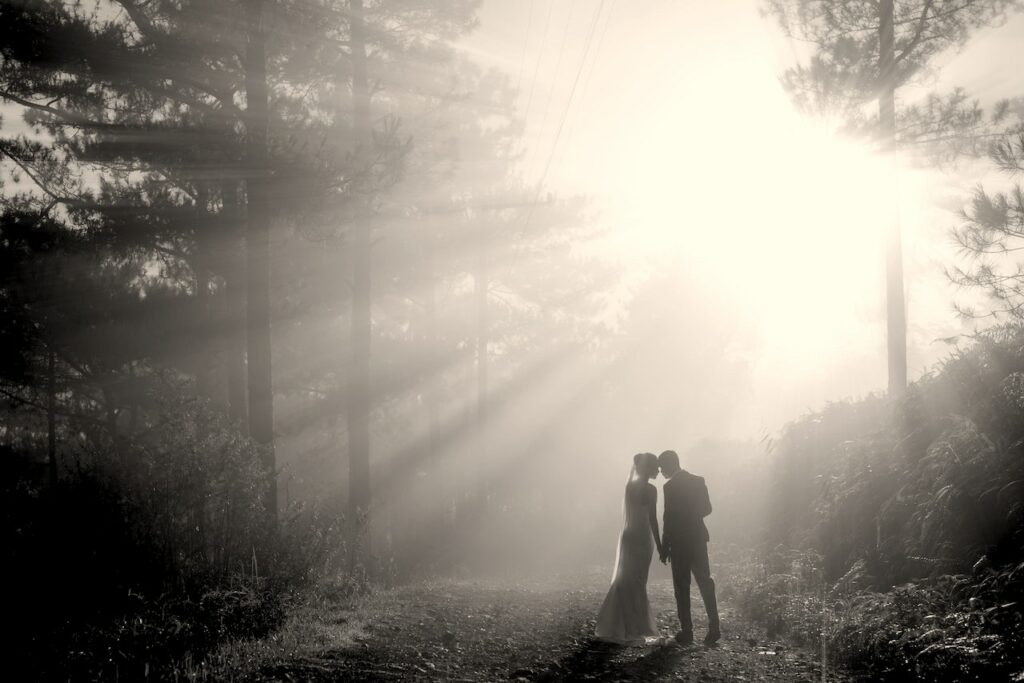
Think about it—God provides for Him a Bride. First God sees—vision. Then it becomes what?—Provision! “Jehovah-jireh,” God provides! “And it is said unto this day, in the mount of the Lord it shall be seen” (Genesis 22:14), a common phrase among the Jews. Who’s going to be seen? What mount? What are they talking about? It is Mount Moriah. “And it shall be seen.” They’re looking for that Messiah. Who is He? He was the Ultimate Sacrifice, the Lamb of God.
“For God so loved the world, that He [provided] His only begotten Son, that whosoever believeth in Him should not perish, but have everlasting life” (John 3:16 emphasis added). And “By faith Abraham, when he was tried, offered up Isaac: that he that had received the promises offered up his only begotten son of whom it was said, That in Isaac shall thy seed be called…” (Hebrews 11:17-18 emphasis added).
The Old Testament sacrifices and requirements were necessary to fulfill the Law. But no one can fulfill the Law in his own self.
The line of this seed didn’t run through Ishmael. It went all the way through Scripture from Isaac to whom? The Lamb of God!—the only begotten Son of God—the sinless, spotless Lamb. The Old Testament sacrifices and requirements were necessary to fulfill the Law. But no one can fulfill the Law in his own self.
The Law can only go so far. It can’t go all the way over, because we are sinful human beings. We need it. But “God so loved the world that He gave His only begotten Son that whosoever believeth in Him should not perish but have everlasting life.” See the connection here? Jesus went all the way over and fulfilled the Law for us!
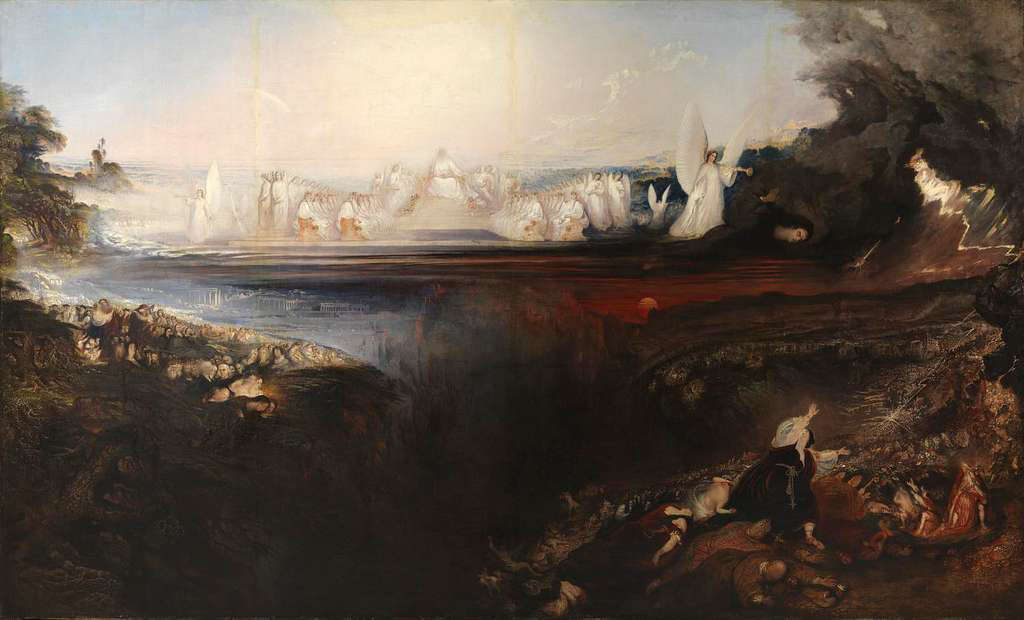
The wrath of God is not for His people. “…because of these things cometh the wrath of God upon the children of disobedience” (Ephesians 5:6). Upon whom? Not His people. Not anyone but the children of disobedience—sinners who refuse to turn to the Lord.
“Then the soldiers of the governor took Jesus into the common hall, and gathered unto him the whole band of soldiers” (Matthew 27:27). Later Jesus cried out to His Heavenly Father, “…Why hast thou forsaken me?” (Matthew 27:46). Jesus went through the most agonizing and cruel time of any person’s life. It was the total forsaking by God of His own Son.
Later, “…about the ninth hour…Jesus yielded up the ghost [spirit]” (Matthew 27:46, 50). At that time, Jesus took on Himself all the sins of the world—everybody’s sin—past, present, future. Not just during that current time, not just during the time with the thieves on the cross beside Him, not just the time of the Pharisees, the Sadducees or anyone else around, not just for the Old Testament, but for everybody of all time. He took it all on Him.
He came down from heaven of His own free will, died to fulfill the Law, to reconcile us with the Father. He put us together with God again.
But God could not look at that because He cannot look at sin. He had to cover it because He’s a holy God. He cannot accept sin. His own pure and spotless Son—forsaken. He had not hurt anyone. He had not done anything wrong. He was God. How could He have done anything wrong? He came down from heaven of His own free will, died to fulfill the Law, to reconcile us with the Father. He put us together with God again. He brought us back to that state that man was in in the Garden of Eden.
Then Jesus “…yielded up the ghost. And, behold, the veil of the temple was rent [torn] in twain [two] from the top to the bottom…” (Matthew 27:50-51). Not bottom to top. God rips from the top straight down. Then, “…the earth did quake and the rocks rent” (Matthew 27:51). Even the rocks couldn’t withstand it. “And the graves were opened…”(Matthew 27:52). Truly this was the Son of God!
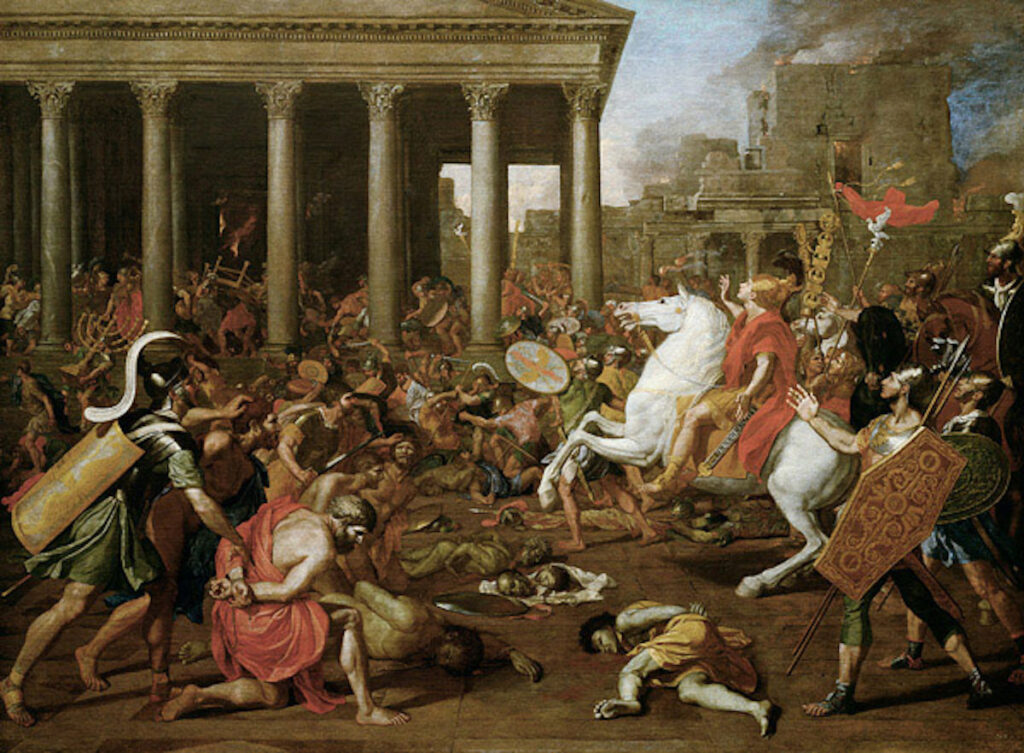
What happened after God rent the veil of the temple? Not many years after that, the Romans came through and destroyed the temple—all of it. The ruler in charge of Rome at that time told the soldiers to spare the temple. All of the Jews who could fled into the temple because they knew they would be safe there, since it was the strongest building around. The blocks of this temple were not like simple concrete blocks. They were huge. When the drunken soldiers came to it, one took a fiery dart and shot it into the temple.
The fire it caused destroyed the temple and incinerated all the Jews in there. It was so hot that the gold on the roof melted, ran down, and filled the cracks between all the stones. When the soldiers took over Jerusalem, they looted all that gold. How did they do it? They had to turn over each stone, one at a time. Not one stone was left unturned, just as Jesus had predicted. Prophecy was fulfilled to the letter.
The veil was rent (or torn) from top to bottom. Why had it been there?—to block access to the Holy of Holies. But it was torn! The Law was fulfilled. The Holy of Holies was not needed. The temple was not needed. Who is now the temple? His people are. Who is now the Great High Priest? Jesus is.
Under the Law, certain sacrifices had to be made. The Great High Priest would enter the Holy of Holies once a year. The Jewish festival Yom Kippur was an annual time of repentance, when the Jews would present a sacrifice for their sins before the priest. It was the only time that they could hope that it would be accepted. But it was not complete. Nothing was complete, because the Law was never final. It brought them to the point of the cross, but it couldn’t bring them past it.
No longer is there a need for a sacrifice, no longer a need for a High Priest, no need for the temple now, because Jesus is our High Priest. We can go directly to Him. No longer are sins confessed only to be wiped away for another year, never eliminated.
What changed the situation? Christ came and separated all that. He didn’t abolish the Law, but He eliminated all the sacrifices, because He became the final sacrifice—for all we’ve gone through—all our problems, all our needs—He is our final sacrifice. He fulfilled the Law, all of it.
No longer is there a need for a sacrifice, no longer a need for a High Priest, no need for the temple now, because Jesus is our High Priest. We can go directly to Him. No longer are sins confessed only to be wiped away for another year, never eliminated. The Law could not eliminate sin. It could only cover sin. But Jesus did eliminate it. He can wash us whiter than snow.
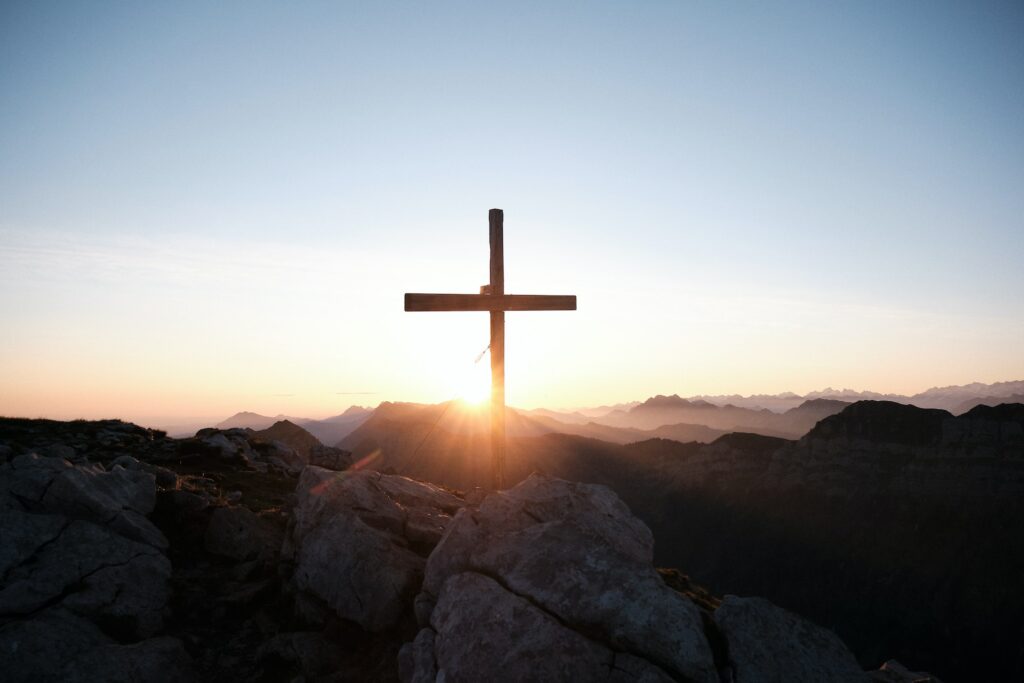
What is our solution for sin? What is our provision? No longer is it an incomplete process. Jesus became our provision, our Jehovah-jireh—God provides. He sent His Son. He provided for His three children in the fiery furnace. He provided for His three children of Noah. Throughout the Bible He provided for His children, meaning those who believed in Him. If you don’t believe in Him, what happens? You are lost. He is our provision, our provider, Jehovah-jireh. He sees our needs. He sees where you are, and He provides. Whether it is financial needs, spiritual needs, whatever needs—He provides because He sees our needs.
We look to Him, our provision, our High Priest. He rent the veil. We can go into the Holy of Holies now because we are the temple of the Holy Ghost, and He is our High Priest.
But we better believe in Him. If we don’t believe in and obey Him, what happens? Wrath! And after wrath? Death. We look to Him, our provision, our High Priest. He rent the veil. We can go into the Holy of Holies now because we are the temple of the Holy Ghost, and He is our High Priest. We no longer have to present all the sacrifices, because He is our sacrifice.
Now we can see the Father because of His Son. We can’t physically see Him, but we can see His Son. And His Son can live in us. What is the solution? He is. When we bring our needs to Him, He is our solution, our provision. He sees our needs; He knows our needs. Ask Him and He will provide. Do you have a need? We’ve got a provider—we’ve got Jesus. Have you looked to Him yet?
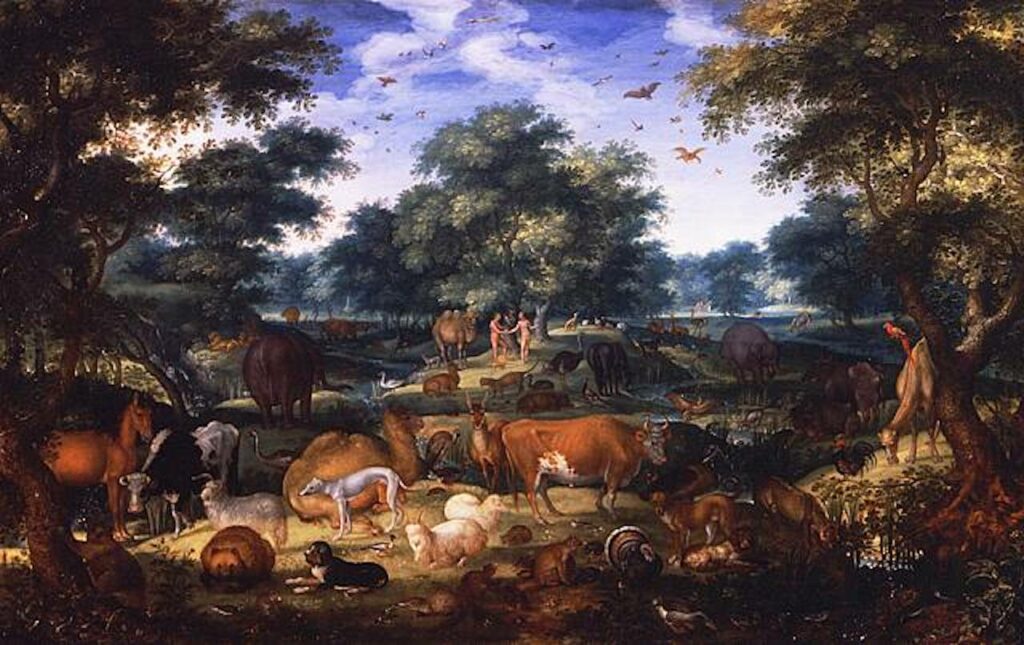
In the Garden of Eden, the first couple was able to communicate with the Heavenly Father freely. Why? Because they had no sin. When sin came in, they could no longer do it! God can’t look at sin. Look back at Isaac and Ishmael. God does not recognize the works of the flesh. It’s sin. But He will recognize Isaac. He told Abraham, “…in Isaac shall thy seed shall be called” (Genesis 21:12).
If we go along with unbelief and don’t believe in Him, what will happen? He is not going to recognize us. If we cry out to Him in unbelief, He won’t hear what we are saying.
What does this mean? He looks at the works of the Spirit, the works of those that believe in Him. If we go along with unbelief and don’t believe in Him, what will happen? He is not going to recognize us. If we cry out to Him in unbelief, He won’t hear what we are saying.
So I ask you, do you have a need? He is your provider, your solution, your High Priest. No longer do you have to bring a sacrifice to Him. Doing good works to win His favor has been eliminated because we come to Him now by faith. We come to Him believing that He will accept us with all our needs, problems and conditions. If you have a need, He is your provision. Look to Him. â–
[Additional image credits: Opening Image by Philippe de Champaigne from Bridgemanart Library on Picryl (Public Domain Mark PDM)]

